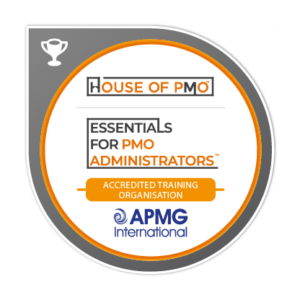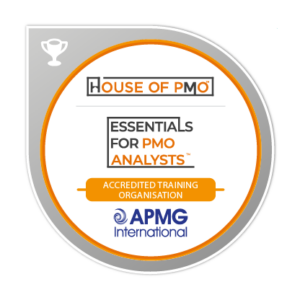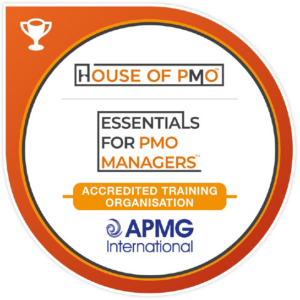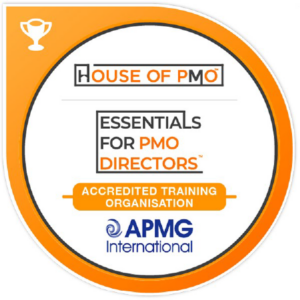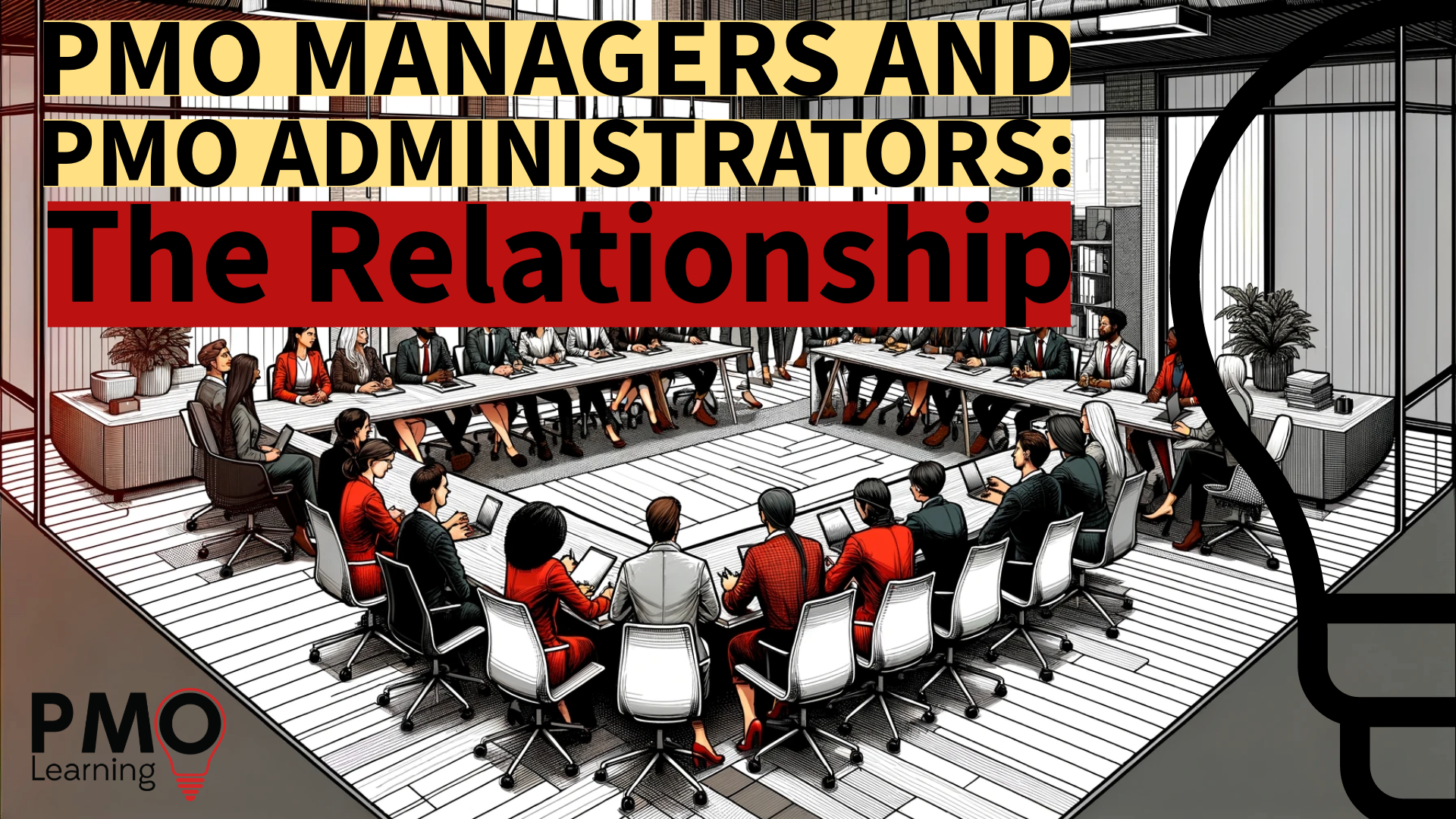
In this article, we take a look at two different roles in the PMO and explore the symbolic relationship that sees them both working together to enable the smooth operation of the PMO.
First, we take a look at each of the roles and then look closer at how they work together and what they need from each other in order to perform their role well.
The PMO Administrator Role
The purpose of the PMO Administrator role is to support the Project, Programme or Portfolio Manager and their team in administrative and secretariat aspects. That’s the definition taken from the PMO Competency Framework (just one of the textbooks for the Essentials for PMO Administrators course)
You can find out more about the full role and responsibilities for the [PMO Administrator], but in essence, it is regarded as the entry-level role in the PMO and is focused on supporting Project Managers and their project teams in areas such as reporting, tracking, updating information, and generally being the central point of contact for the project.
The PMO Manager Role
At the opposite end of the scale, the PMO Manager tends to be someone who has worked within project management and PMO for a while. You can find out about the [key responsibilities of a PMO Manager] here, but simply put, they are responsible for setting up and running the PMO.
In the competency framework, the purpose of a PMO Manager is described as, “set up, run, transform, and close an office that supports P3M (project, programme and portfolio) delivery and capability.”
So we have two different roles within the PMO – one at the more experienced end of their career, managing or leading the other, new into the world of PMO and project management.
Working Together – PMO Administrator and PMO Manager
Here’s how PMO Administrators and PMO Managers can work together and what they need from each other:
1.Communication
 The PMO Manager needs clear, timely updates from the PMO Administrator on project documentation, scheduling, and reporting. Conversely, the Administrator needs guidance, feedback, and strategic insight from the PMO Manager to ensure their work aligns with the broader project and PMO goals.
The PMO Manager needs clear, timely updates from the PMO Administrator on project documentation, scheduling, and reporting. Conversely, the Administrator needs guidance, feedback, and strategic insight from the PMO Manager to ensure their work aligns with the broader project and PMO goals.
The PMO Administrator tends to be given clear instructions when they first start working in a PMO – what needs to be done, how it needs to be completed, who the work is being done for, what the timescales and deadlines are, any other work that can only be done when this piece is completed (dependencies) and feedback on how the task can be done better next time.
It’s the responsibility of the PMO Manager to set tasks with clear instructions and give plenty of opportunity for the PMO Administrator to ask questions about what is expected of them. It’s also the PMO Manager’s responsibility to make sure the PMO Administrator has everything available in order to carry out their tasks well – the right equipment, access to the right websites and internal programs, the tools of the trade (whether that’s a Sharepoint site, a PPM tool, a template)
The PMO Manager is also responsible for ensuring that the PMO Administrator is on the right track with work production and that it meets the right standards. In the early days, PMO Administrators need that extra reassurance that what they are doing is right!
[Find out more about the role of the PMO Administrator]
2.Support and Guidance
 The PMO Administrator often looks to the PMO Manager for mentoring and support, helping them to navigate complex project challenges and develop professionally. The PMO Manager, in turn, relies on the PMO Administrator to handle logistical and administrative tasks efficiently, freeing them up to focus on strategic planning and stakeholder management.
The PMO Administrator often looks to the PMO Manager for mentoring and support, helping them to navigate complex project challenges and develop professionally. The PMO Manager, in turn, relies on the PMO Administrator to handle logistical and administrative tasks efficiently, freeing them up to focus on strategic planning and stakeholder management.
Aside from the normal day-to-day support – the on-the-job tasks and activities being carried out, the PMO Administrator will be developing their craft every day. The PMO Administrator looks to the PMO Manager to help steer them in the right direction when it comes to tackling new tasks or taking on more complex projects (perhaps the team is bigger or there are multiple stakeholders across different locations). Gaining confidence in the PMO administration role is crucial if the PMO Administrator wants to get on in their career and a PMO Manager’s support and guidance is really needed here.
From a PMO Manager’s point of view, it is their experience in people management aspects that really make a difference to individuals working in their PMO. The support and guidance is not just about helping PMO Administrator’s with the technical aspects of their role (the how to complete this form or template for example) it is about how the PMO Administrator engages with Project Managers and team members, how to craft emails or send a tricky message, those interpersonal skills that come through experience – and having a good mentor to help guide you through it.
[Find out what the top five skills are for a PMO Administrator]
3.Project Delivery Support
 For effective project delivery support, the PMO Manager needs the PMO Administrator to gather and organise essential data in a number of different ways which ultimately helps in making informed decisions. The PMO Administrator benefits from learning how the project is being managed and what their role is in the bigger picture which enables them to contribute more effectively.
For effective project delivery support, the PMO Manager needs the PMO Administrator to gather and organise essential data in a number of different ways which ultimately helps in making informed decisions. The PMO Administrator benefits from learning how the project is being managed and what their role is in the bigger picture which enables them to contribute more effectively.
When a PMO Administrator is just starting out in PMO there is a lot to learn about in a project. The PMO Administrator has to be able to understand what a project is, what project management is, what the lifecycle means and what work is expected to be carried out and by whom. There is a lot to take in – working with a Project Manager and a project team can be pretty full on, with people asking for help or information at any time. Often PMO Administrators when they first start working in the PMO – and supporting projects – focus on providing the basics. These basics tend to be collating data and information in templates and forms, producing reports and formatting documentation. It’s through this type of work that the PMO Administrator can begin to understand what the project is about and what the Project Manager is doing to steer the ship.
PMO Managers, with their many years of experience working in project management, should always be on hand to answer questions and offer advice. It’s also the PMO Manager’s responsibility to ensure the PMO Administrator has the right kind of training to help them in their early years of working in a project environment. The Essentials for PMO Administrators course has been an ideal training course to offer. Not only does it cover the basics of the PMO Administrator role, it also gives new PMO Administrator’s confidence in themselves when working in this role for the first time.
4.Performance and Development
 PMO Administrators are right at the beginning of a career in PMO and really rely on a good manager to help them understand their role and how it might develop in the future. PMO Administrators should be seeking opportunities for professional growth and skills enhancement to better support the PMO and project needs. This includes training in new project management software, methodologies, or interpersonal skills.
PMO Administrators are right at the beginning of a career in PMO and really rely on a good manager to help them understand their role and how it might develop in the future. PMO Administrators should be seeking opportunities for professional growth and skills enhancement to better support the PMO and project needs. This includes training in new project management software, methodologies, or interpersonal skills.
PMO Managers should be facilitating and supporting these development opportunities, recognising that investing in the PMO Administrator’s growth contributes directly to the PMO’s capability and efficiency. Supporting development shouldn’t be a once-a-year performance review activity, it is an ongoing, highly adaptable thing – mainly driven by the different scenarios the PMO Administrator is being exposed to on dynamic, fast-moving projects.
PMO Administrators also benefit from regular, constructive feedback on their performance, including areas for improvement and recognition of their successes. This feedback loop is essential for professional development and job satisfaction.
PMO Managers rely on PMO Administrators to also provide feedback on the processes, systems, and strategies employed by the PMO. PMO Administrators, being closer to the day-to-day operations, can offer valuable insights into what is working well and what might need adjustment. As they say, ‘everyday is a learning opportunity’ and that applies just as much to the experienced PMO Manager too!
[There are many different training options for PMO people, take a look at what PMO Learning offer]
5.Trust and Reliability
What all PMO Managers and PMO Administrators need in their day-to-day working lives is trust. The PMO Manager must trust the PMO Administrator to manage their responsibilities autonomously, while the PMO Administrator needs to rely on the PMO Manager for direction and support when needed. It’s as simple as that!
Enjoying Our Blog?
Sign up and receive all our articles (we’ll send you an update once a week!) plus special offers and events:








